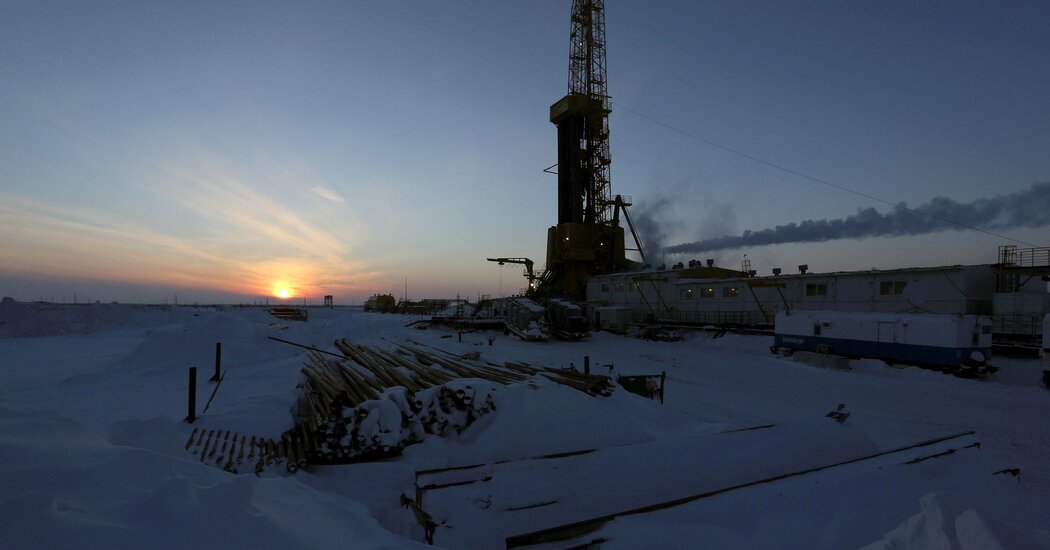Global inventories plunged and energy prices rose on Monday as attacks on Ukraine escalated and governments considered imposing increasingly harsh economic penalties on Russia, including halting Russian oil imports. It was Wall Street’s worst day in over a year.
The S&P 500 fell 3 percent, its sharpest daily decline since October 2020. The Nasdaq composite fell 3.6 percent and is now 20 percent lower from its November high, entering an area known on Wall Street as a bear market, indicating a serious downturn.
Aside from the shock and uncertainty of the war, the conflict has raised concerns about ongoing inflation worldwide.
Russia is a major exporter of energy products, supplying 10 percent of the world’s oil and 40 percent of Europe’s natural gas. US lawmakers on Monday pushed for a ban on Russian energy imports into the United States. There were also calls to suspend normal trade relations with Russia and Belarus in response to the invasion of Ukraine.
Brent oil, the global benchmark, ended Monday up about 4.3 percent to $123.21 a barrel, but had previously climbed to $139. The price of oil has risen about 26 percent in the past week as the conflict has intensified.
Some analysts say the Russian attack on Ukraine is likely to have lasting effects on commodity markets. In addition to energy, Russia is a major producer of staples such as wheat, aluminum and palladium, which are used in cars and telephones – and the prices of those commodities have skyrocketed as well.
And, as analysts at Citigroup recently wrote, this geopolitical turmoil is happening as many countries have committed to “undoing” fossil fuel energy habits to tackle climate change.
The bipartisan push from lawmakers to halt oil imports is increasing pressure on President Biden to turn off the tap. Secretary of State Antony J. Blinken on Sunday, during his recent tour of countries near Ukraine, added to the expectations that some kind of embargo was in the works.
“We are now in very active discussions with our European partners about banning Russian oil imports to our countries, while of course ensuring a steady global oil supply at the same time,” Mr Blinken said on NBC’s “Meet the Press” on Sunday. .
An abrupt decline in oil and natural gas supplies from Russia would pose major problems for industrial users and consumers alike. Cutting off Russian oil would force many refineries that normally process it to find other sources.
Although oil is a relatively flexible commodity, there are many types of crude oil, and a refinery cannot always replace one with another. For example, Washington’s sanctions on Venezuelan crude have resulted in refineries in the United States buying more Russian oil as a substitute, pushing up imports. Shell, Europe’s largest oil company, said on Saturday it had bought Russian crude oil because deliveries from “alternative sources would not have arrived in time to avoid disruptions to the market supply”.
Investors were already nervous about inflation, which was the highest in decades in the United States and Europe after the pandemic closed factories and paralyzed supply chains.
Economists expect the consumer price index on Thursday to show that prices in the United States rose by 7.9 percent during the year to February. And that lecture took place before the effects of the war really became noticeable. For example, gas prices rose Monday to the highest level in the United States since 2008: $4.06 a gallon, according to AAA, 45 cents more than a week ago.
Central banks have begun aggressively raising interest rates as they shift their focus from supporting economic growth to fighting inflation. The end of easy money and the lure of higher interest rates – which make riskier investments less attractive – had already sent stocks plummeting before the Russian invasion.
But the financial consequences of the war hit Europe hardest. Natural gas is less flexible than oil and Europe is much more dependent on it as a fuel. Prices for natural gas in Europe were many times higher than a year ago and have risen even higher, to EUR 345 per megawatt hour on Monday before falling back to EUR 215, a gain of 11.7 percent.
“It’s so expensive that your utilities are going to be in big losses,” said Henning Gloystein, director of the Eurasia Group, a political risk company.
The Stoxx Europe 600 fell 1.1 percent, closing more than 15 percent Monday since its high on Jan. 5. Germany’s DAX index fell 2 percent, pushing it into bear market territory.
“Amid great uncertainty, European risk markets have every reason to sell,” Holger Schmieding, chief economist at German bank Berenberg, wrote in a note Monday. But he said that “a real financial crisis seems unlikely in the advanced world.”
“Fear can cause anxiety. But as with previous severe shocks, eventually markets need to see through the dramatic risks of short-term events,” he said.
The S&P 500 is 12.4 percent lower than the January record. The energy sector, which is up about 35 percent since the beginning of the year, is the only part of the S&P 500 that has not fallen this year. Major tech stocks, which make up a large chunk of the Nasdaq and also weigh heavily on the S&P 500, have been hit particularly hard by uncertainty about the future of US interest rates.
Coral Murphy Marcos and Stephen Gandel reporting contributed.
March 7, 2022
An earlier version of this article and an accompanying news warning misrepresented the last time the S&P 500 fell more than on Monday. It was in October 2020, not May 2020.

